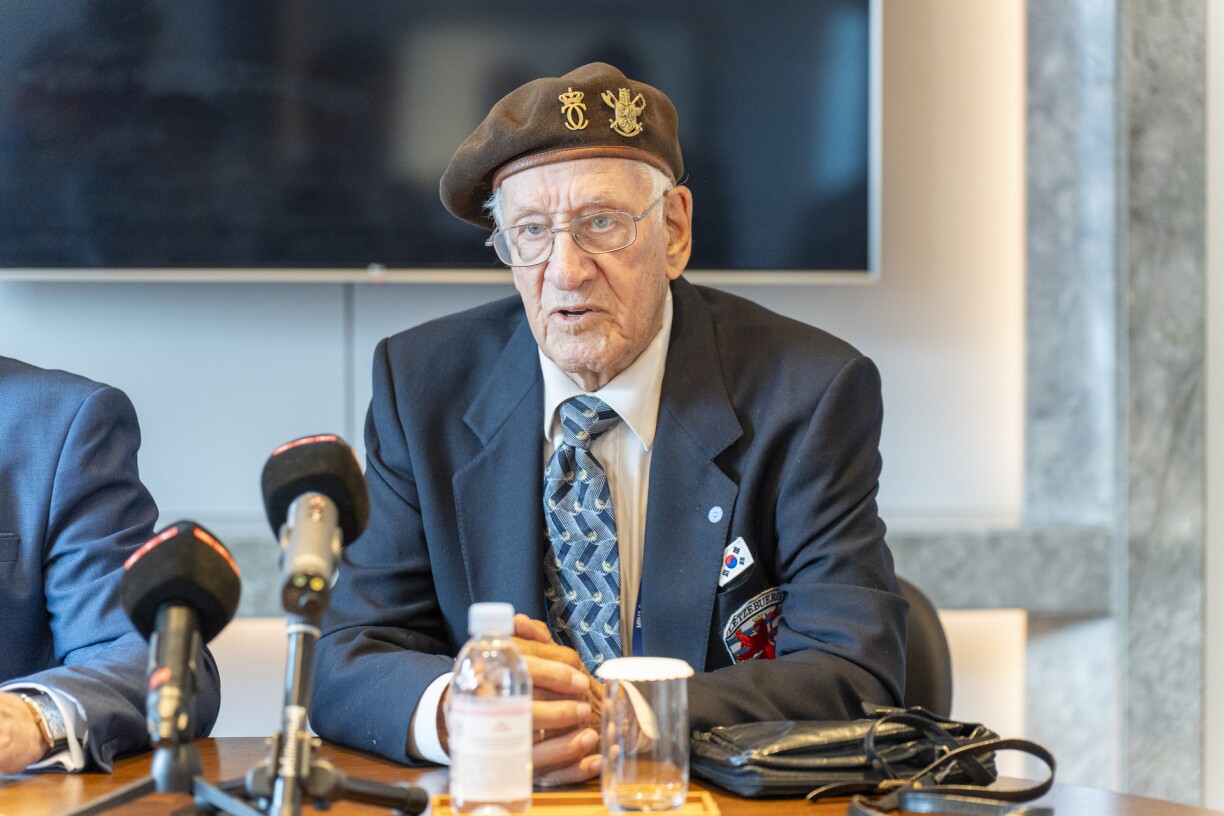
It is humid in Seoul, with temperatures reaching around 30 degrees during the rainy season. But Léon Moyen, 92, a veteran of the Korean War, braves the conditions and traverses the huge square in front of the Memorial of the Korean War in the South Korean capital. He is supported by his walker, which he sometimes jokingly refers to as his “horse.”
Moyen, accompanied by his son, made the journey from Toronto, Canada, where he has spent his life with his family. Joining him in this solemn occasion was Prime Minister Xavier Bettel, as they laid a floral tribute to the memory of the 85 Luxembourg volunteers who fought for South Korea during the early 1950s conflict.
This week marks the 70th anniversary of the historic armistice signed between North and South Korea. The event saw the presence of numerous representatives from nations that supported South Korea during those challenging times.
Two of the Luxembourgish volunteers lost their lives in Korea. At this moment, Léon Moyen is not in the mood for jokes. Robert Mores was not only a comrade, but also a good friend. Moyen remembers Mores’ last gesture among comrades when he got into his foxhole after a night in his sleeping bag.
“He came in with a tin can, saying he had made some tea and asking if anyone wanted some. I said OK, bring it over. And he put the tea on the floor next to me. After two minutes I had a taste. However, the tea was still too hot to drink. But in the meantime, he had already been torn to pieces. He had taken a direct hit,” Moyen recalls.
Mores was on his way to go dig out two comrades who had been buried in a bunker.
“That was pretty much the worst day I had in Korea. The tea was still sitting there, it was still too hot to drink. By then he was already gone,” Moyen says.
On his initial deployment to Korea, Moyen himself had been injured in the leg and was taken to a hospital in Japan. He almost lost his leg. “But they fixed it,” he says, “I kept my leg.”
Afterwards, he was sent back home to Luxembourg. But because his deployment was supposed to last a year, and he had been injured after just a few months, Moyen had himself sent back to Korea to finish his year. After a few months at home, Moyen says, he missed Korea and enlisted again, despite his injury.
Why did Léon Moyen go to war of his own free will? Growing up in the north of Luxembourg, Moyen had witnessed the Battle of the Bulge as a young boy during the Second World War: “At that time, our country was also overrun by our neighbour, the German army. That was not nice at all.”
When North Korea attacked the South, Moyen felt reminded of his own war experience. “That got to me a little bit. I then thought to myself, come on, you should go help them,” Moyen explains.
“We were relying on the Americans. They got us out. And then I thought, I should do the same thing they did for us. That was my original reason for enlisting,” Moyen remembers.
In addition, the post-war prospects were limited, with few employment opportunities available. “We didn’t have much to lose in terms of work. Sometimes, you found a job that allowed you to do a bit of work with a shovel to earn a few francs. But there wasn’t anything permanent yet,” Moyen says.
But there was something else: Moyen wanted to travel the world. And that’s exactly what he did on the way to Korea, he says. The ship that transported the soldiers from Belgium to Korea docked at many ports along the way.